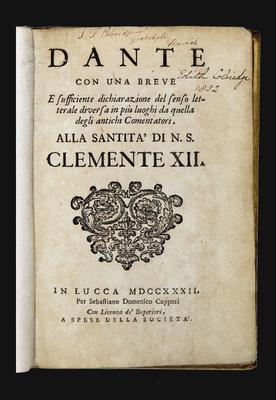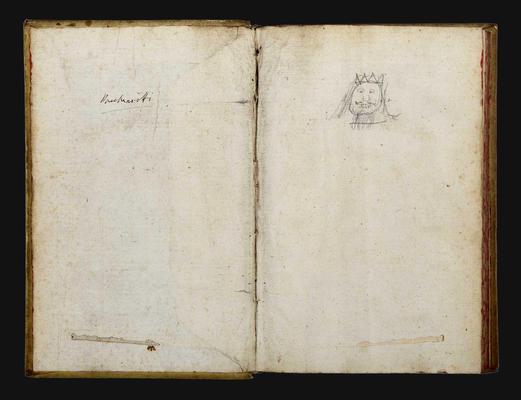Dante Alighieri
Dante con una breve E sufficiente dichiarazione del senso letterale diversa in più luoghi da quella degli antichi Comentatori...
Lucca, Sebastiano Domenico Cappuri, 1732.Three volumes in 8° (200x130 mm). [20], 261, [7]; [4], 273, [11]; [4], 294, [10] pages. Printer's ornaments and decorated initials. Uniformly bound in contemporary vellum. Smooth spines, title gilt on painted letteringpieces. Edges speckled red. On the front pastedown of the volume containing the Purgatorio an inked note in Coleridge's own hand ‘Pachianetti', referring to the Spanish wine Pajerete. This Italian form Pachianetti also occurs in Coleridge's notebooks, and in other manuscripts by him. The Coleridge expert George Whalley has argued that “the word had some secret personal meaning for him”. In Edith Coleridge's hand the pencilled notes ‘Nov 5th 1887' at the end of the Purgatorio (vol. 2, p. 273), and ‘Dec 22nd 1887 Eldon Lodge Torquay' atthe end of the Paradiso (vol. 3, p. 294), showing the progress of her reading of the Commedia. On the front flyleaf of the second volume a rough drawing in pencil of a crowned figure, possibly a king (probably in Edith's hand).
Provenance: William Wordsworth (1770-1850); Samuel Taylor Coleridge (1772-1834; signed on the title-page of the first volume, ‘S. T. Coleridge Gretahall Keswick'; see The Collected Works of S. T. Coleridge. Marginaliaii. Ed. by G. Whalley, London-Princeton 1984, pp. 131-132); his nephew and executor Henry Nelson Coleridge (1798-1843); his grand-daughter Edith Coleridge (1832-1911; ownership inscription on the first title-page, ‘Edith Coleridge 1852'); Sotheby's, English Literature, History, Children's Books and Illustrations, London, 13 December 2007, lot 49; Livio Ambrogio collection.
A precious association copy: the Lucca edition of the Commedia from the library of the famous poet and writer Samuel Taylor Coleridge, one of the founders of the English romantic movement, presented to him as a gift in 1804 by his friend and fellow-poetWilliam Wordsworth.In his reading Coleridge had come across Dante, at the time almost forgotten in Italy, and in March 1819 lectured on the Florentine poet at the Royal Institution. He had a very high opinion of Henry F. Cary's ‘incomparable' translation of the Commedia, but already in February 1804, before his departure in April for Italy and Malta, expressed a wish to read Dante's poem in the original Italian. He asked Wordsworth to send “Dante & a Dictionary” to Greta Hall in Keswick, in the Lake District, where he was living at the time, and according to the Coleridge expert George Whalley, the 1732 edition of the Commedia, with a commentary by Pompeo Venturi, appears to have been the copy Wordsworth sent in response to Coleridge's request. On his return, the poet stayed with the Wordsworths at Allan Bank, where in 1810 he left his books. This copy of Dante was included in Wordsworth's list of the volumes to be sent in 1829-1830 to Highgate, Coleridge's last London residence.In his copy of the 1819 edition of Cary's translation (today in the British Library), there are some marginalia which reveal Coleridge's careful study of the Lucca edition. Furthermore, the ownership inscription by his grand-daughter Edith is dated '1852', the year of the death of her mother Sarah, the only daughter of Coleridge, a brilliant essayist and in her turn an ardent admirer of Dante: the copy presented here offers therefore a striking testimony to Dante's popularity in English romantic circles and later in the Victorian age.



